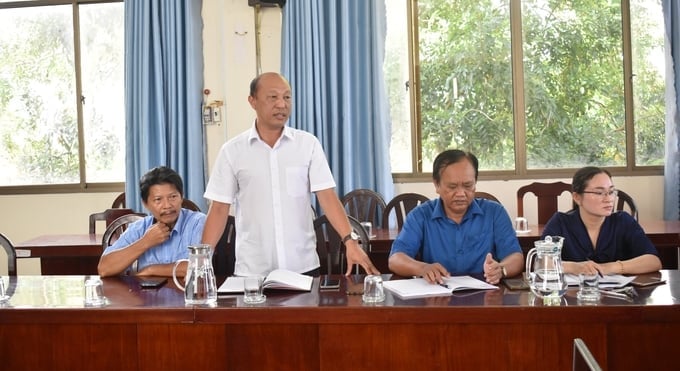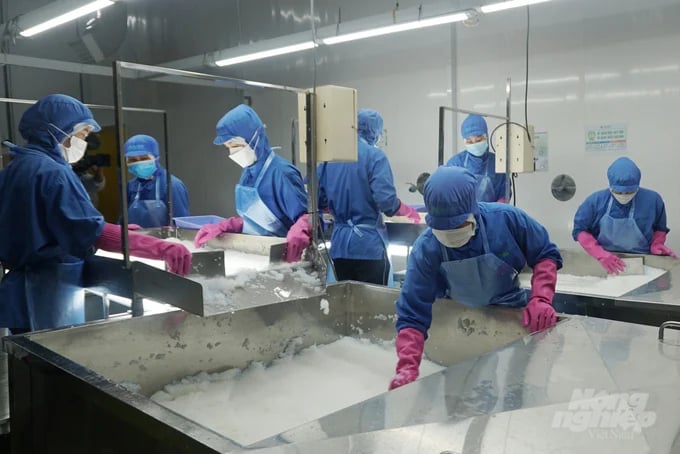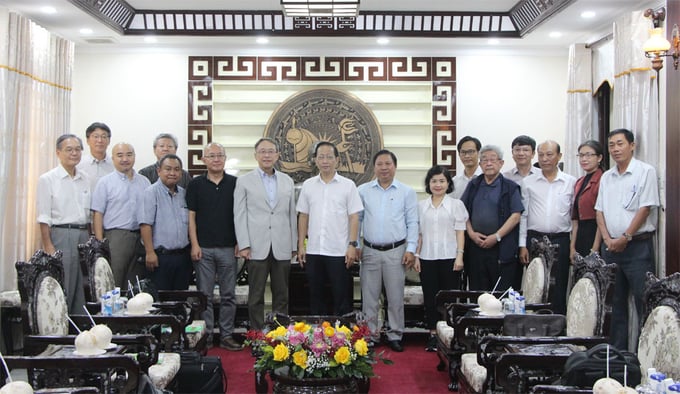May 25, 2025 | 14:58 GMT +7
May 25, 2025 | 14:58 GMT +7
Hotline: 0913.378.918
May 25, 2025 | 14:58 GMT +7
Hotline: 0913.378.918
Mr. Nguyen Van Vu, Chairman of the Board of Directors of Dong Duong Coconut Joint Stock Company in Mo Cay Bac district, Ben Tre province, reported that the company is collaborating with experts from Osaka Metropolitan University in Japan to invest in a research project for processing biofuel from coconut residue.

Mr. Nguyen Van Vu (standing), Chairman of the Board of Directors of Dong Duong Coconut Joint Stock Company, reporting to the leaders of Ben Tre province on the project in collaboration with Japanese partners to research and produce bio-jet fuel from coconut oil. Photo: Minh Dam.
In 2021, Dong Duong Coconut Joint Stock Company cooperated with experts from Osaka Metropolitan University to begin researching on a project for the production of aviation biofuel and diesel from coconut oil extracted from the residue of dried coconut flesh. The research showed that coconut oil contains the 8 - 10 - 12 carbon chain, which can withstand temperatures of up to 249 degrees Celsius and negative 45 degrees Celsius. This is a crucial component used in the production of aviation fuel.
The use of 100% fossil fuels is prohibited in developed countries with strict regulations on chemical fuels. Additionally, there is a requirement for the use of biofuels such as bio-jet fuel and bio-diesel. "Vessels wishing to dock at their ports must use fuel with 30% bio-diesel content, and the same applies to airplanes," explained Mr. Nguyen Van Vu.
According to Mr. Vu, the company has signed an exclusive research and technology transfer agreement with Japanese experts to implement the project. Subsequently, two experts from the Japanese University recently visited Ben Tre province to survey the coconut material area of Dong Duong Coconut Joint Stock Company.
Prior to the survey trip, Mr. Nguyen Truc Son, Permanent Vice Chairman of the Ben Tre Provincial People's Committee, welcomed the delegation of experts from Osaka Metropolitan University, led by Professor Tatsumisago Masahiro, President of Osaka Metropolitan University. Notably, the professor visited to exchange greetings with the provincial leaders during their survey of the coconut material source for biofuel processing.

Ben Tre province boasts considerable potential in the processing of coconut oil. Photo: Minh Dam.
During his visit, Professor Tatsumisago Masahiro informed the leaders of Ben Tre province about the University's activities, and expressed his wish to build strong relationships with universities, research institutes, and businesses in Ben Tre province as well as Vietnam.
Members of the delegation also exchanged ideas on applying advanced technology to transform coconut by-products into useful and high-value-added products. This includes the use of coconut oil as aviation fuel, and as a crucial measure to reduce greenhouse gas emissions.
Ben Tre province houses the largest coconut production area nationwide, with over 78,000 hectares and an annual yield of 800 million fruits. Thanks to an abundant source of raw materials, the province has produced a significant volume of coconut-based products for export to various countries globally. Presently, Ben Tre province has 62 foreign direct investment projects with a total investment capital of approximately 1.6 billion USD. In addition, the province's annual export turnover is estimated at 1.5 billion USD, with significant contributions from Japanese businesses.

Leaders of Ben Tre province taking a commemorative photo with experts from Osaka Metropolitan University in Japan during the survey on the local development of coconut material areas. Photo: Phuong Thao.
Through a series of discussions, the leaders of Ben Tre province were highly impressed with the proposal for research aimed at diversifying coconut products to improve the local value chain, including the use of coconut oil as aviation fuel. This is also a meaningful project that aligns with the Vietnamese government's commitment to achieving a net-zero emissions target by 2050 (whereby Vietnam aims to reduce greenhouse gas emissions to as close to zero as possible).
The provincial leaders instructed local businesses to continue collaborating and assisting the delegation from Osaka Metropolitan University in visiting, surveying and conducting research for the project.
"The research on coconuts will receive our warmest welcome, and Ben Tre province is always ready to cooperate in enhancing the value of the local coconut industry for the benefit of the people and businesses," affirmed Mr. Nguyen Truc Son.
According to statistics, approximately two-thirds of households in Ben Tre province engage in coconut production, with an estimated output of 200 coconut-based products. This contributes significantly to the income of the local population as well as the province's economy. Nearly every part of the coconut tree serves various human needs. For instance, the coconut leaves are used to make brooms, thatch for roofs, and the coconut trunk is used for crafting boards, furniture, and artistic items. Additionally, the coconut shell is utilized in creating bowls, musical instruments, and handicrafts.
Translated by Nguyen Hai Long

(VAN) The People's Committee of Tra Vinh province has approved an adjustment to the investment policy for the Green Hydrogen Plant project, increasing its area to approximately 52.76 hectares.
![Reducing emissions from rice fields: [2] Farmers’ commitment to the soil](https://t.ex-cdn.com/nongnghiepmoitruong.vn/608w/files/news/2025/05/05/dsc08881jpg-nongnghiep-140632.jpg)
(VAN) Clean rice cultivation model in Thuong Tan commune, Bac Tan Uyen district, is assisting local residents in achieving sustainable agriculture by substantially reducing costs, increasing productivity, and protecting the environment.

(VAN) At the conference to disseminate Resolution No. 68, AgriS introduced its digital agricultural ecosystem and reaffirmed its commitment to accompanying the Government in promoting private sector development and sustainable agriculture.

(VAN) 'Blue Ocean - Blue Foods' initiative is designed to restore marine ecosystems and establish sustainable livelihoods for local communities by cultivating a minimum of 1,000 hectares of cottonii seaweed in the first three years.
/2025/05/21/4642-3-112707_603.jpg)
(VAN) The V-SCOPE project has made direct contributions to three out of six pillars of the Comprehensive Strategic Partnership between Vietnam and Australia.

(VAN) Facing the threat of rabies spreading to the community, Gia Lai province urgently carries out measures to vaccinate dogs and cats on a large scale.

(VAN) Disease-free livestock farming not only protects livestock herds but also stabilizes production and livelihoods for many farmers in Tuyen Quang.